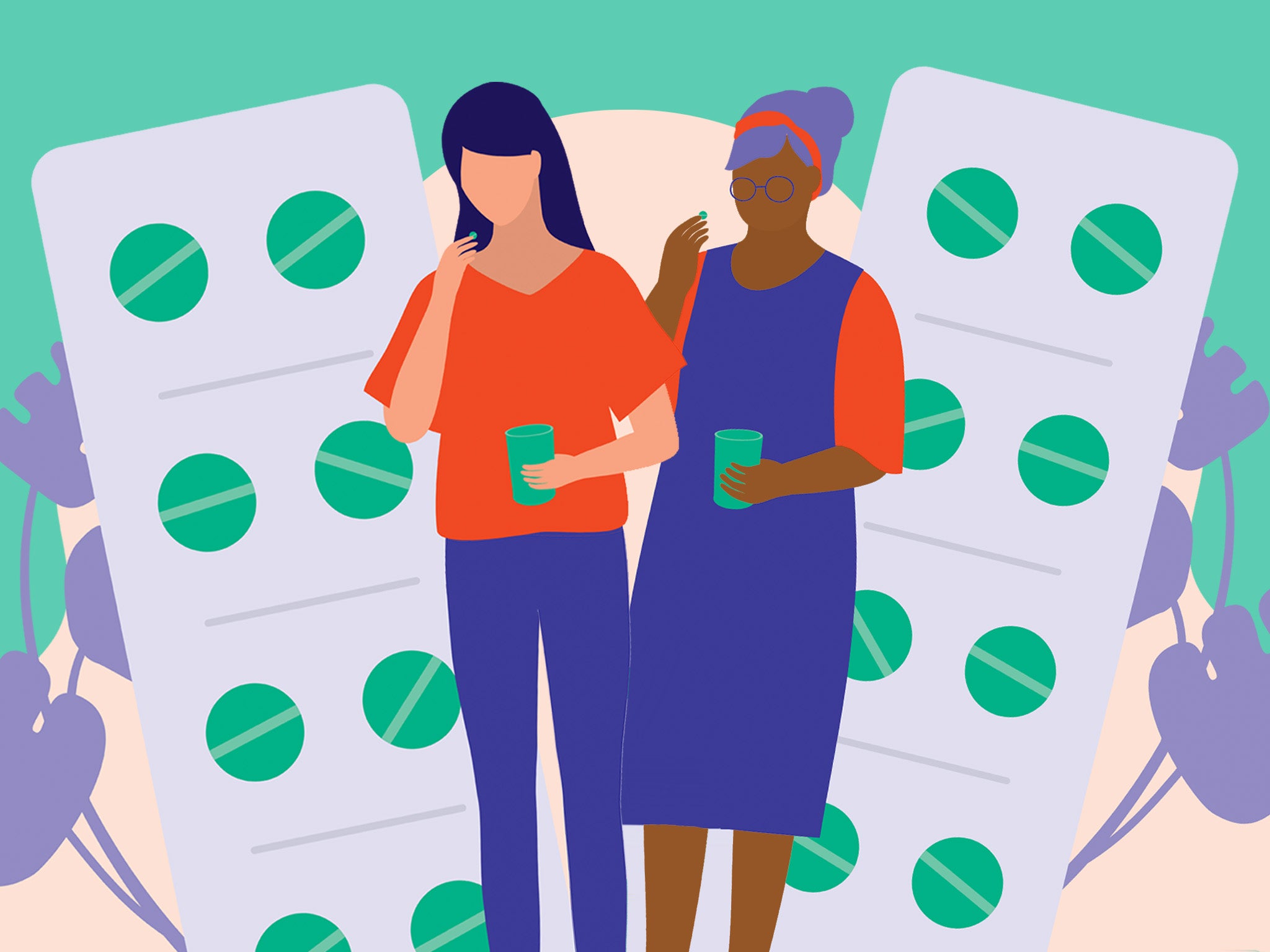‘I’m scared’: The menopausal women whose lives have been catapulted into chaos by HRT shortage
‘By the time I got to 46, I felt 60 or 70. I was like a shell or a shadow of my former self,’ woman tells Maya Oppenheim


The acute hormone replacement therapy (HRT) shortage has wreaked havoc on menopausal women across the country.
From being forced to substantially reduce their dosage to make it last longer, to ringing around dozens of pharmacies to find no one has the product needed, the crisis is leaving many feeling increasingly desperate.
Lucy* is one of those struggling as the HRT – which is used to alleviate menopause symptoms – has emptied pharmacy shelves around the UK.
“So the gel stock runs dry just as I’m about to apply for a permanent promotion for a job I’ve been doing for 14 months,” Lucy tells The Independent. “Blood, sweat, passion and tears for a project that is really important to me, which is ironically about equality, diversity and inclusion.”
Lucy explained not being able to access her usual HRT means she will be forced to go through the job application process while grappling with “hormonal turmoil” from the menopause.
“Where I cannot manage the whole fight or flight response,” she adds. “I just descend into a gibbering wreck. This will likely cost me my job.”
Lucy’s situation is not unique.
The National Institute for Health and Care Excellence (Nice) estimates more than one million women in the UK are currently dependent on some form of HRT. The treatment radically improves the debilitating physical and psychological symptoms of menopause.
When you consider that the majority of the 3.4 million women aged between 50 and 64 in the UK will be experiencing symptoms – ranging from heart palpitations to hot flushes, vaginal pain, changes in mood and much more – it becomes clear just how indispensable HRT is.
While the UK has been hit with a nationwide shortage as a consequence of manufacturing and supply issues since 2019, the deficit has ramped up substantially in severity in recent weeks.
Meanwhile, the number of HRT prescriptions in England have doubled in the last five years.
Louise Newson, a GP and menopause specialist, tells The Independent there are many women around the UK who are reliant on HRT to simply go about their daily lives.
“There’s no doubt about it – we are at crisis point with regards to the supply of HRT,” Dr Newson, who is co-director of Newson Health Menopause & Wellbeing Centre, adds.
“I see so many women come into my clinic who have struggled on a day-to-day basis with menopause symptoms, who are then able to take back control with the help of HRT.
“It is growing increasingly clear to me that the way the medical community views menopause needs to change; this is not a lifestyle issue – it is a health issue, which carries real risks if not treated properly.”
Fiona is another woman who has been put into a state of perpetual anxiety by the shortage.
The 49-year-old told The Independent she now lives in fear her menopause symptoms will return – and her quality of life will deteriorate – if she can’t get her treatment.
Fiona, from Winchester, was previously using an Estrogel pump alongside progesterone tablets, but two months ago she was informed she could no longer get her prescription.
“I was told it was out of stock in all local and a lot of national pharmacies,” she explains. “The explanation given was the massive demand from women and manufacturers not being prepared.”
Fortunately, she was prescribed an alternative type of estrogen gel which she says has worked well for her.
But when coming to renew her prescription for her alternative treatment this month, she was told it is out of stock because so many women are using it as an alternative. In the end, she had to be prescribed a different type of treatment which is in spray rather than gel form.
“I will have to see how that suits me,” Fiona adds. “I worry about them not finding me any alternatives for the next prescription. Each time there is a problem, it takes me a good two to three hours over a few days to ring pharmacies.
“I am lucky to have an employer with flexibility. A lot of women might not – when will they make these calls?”
Fiona explained she has been on HRT for around a year. But before then she was forced to endure four years of very stark menopausal symptoms which drastically impacted her life.
“I had very bad anxiety, very debilitating migraines, problems with urinary symptoms, such as suffering from bladder weakness and incontinence,” she adds. “But my main symptoms were anxiety and very bad migraines and low mood as well.”
She said the symptoms profoundly impeded her ability to do her job in market research as well as she used to but taking HRT has massively improved those symptoms.
Turning her attention to her menopause symptoms, she said she felt like she had aged around 20 years overnight. She struggled with brain fog and concentration levels, she added, saying this was particularly tough as she previously prided herself on her memory.
“At 44, I felt 44, but by the time I got to 46, I felt 60 or 70. I was like a shell or a shadow of my former self. I had really low confidence. You feel like your self disappears. I thought: ’Is this is it now for the rest of my life? I felt like my personality had changed.”
Fiona said the migraines she suffers from massively increased in intensity as she explained they were “debilitating and disabling”. Unsurprisingly, fear she will not get her HRT continues to plague Fiona.
“It is massive uncertainty,” she reflects. “It does hang over me. I think about it every day. What will happen if it runs out completely. I’m scared. I don’t want to go back. I’m not sure women’s mental and physical health is given the urgency and priority they deserve by the government.”
Gilly Langley is also struggling in the wake of the shortage – telling The Independent she recently increased her dose but had to then reduce it as she has not been able to access oestrogel.
“It has taken more than six weeks to get my repeat prescription,” she adds. “In that time my anxiety has returned. This week I finally picked up the prescription so I can up my dose again.”
Terry*, who has accessed support via the Menopause Support network, which works with 10,000 women, has also been finding it hard to get her usual prescription.
“I had to contact 16 different pharmacies before I managed to obtain my last prescription for oestrogel,” she says. “I was really lucky as that pharmacy had just had a delivery. I am currently on sick leave from work with various symptoms, one of which is anxiety.
“My GP thinks this may be menopause-related and I am to increase my oestrogel but I am scared to do this as I am already running low. This situation has increased my anxiety further.”
Her comments come as Sajid Javid, health and social care secretary, said on Friday that he is aware of how dependent women are on HRT.
“Which is why we will leave no stone unturned to help make sure women can get the HRT they need,” the Conservative politician added.
“That is why I have taken decisive action to appoint Madelaine McTernanto [as] head of the HRT taskforce who will use her excellent skills and expertise to build on the success of the Vaccine Taskforce to bolster supply of vital medicines to women across the country.”
Maria Caulfield, minister for women’s health, said the new taskforce would “play a vital role engaging with suppliers, stakeholders and across government to make sure every avenue is explored” to make sure all women who want HRT are able to get hold of it.
“The constant fear of not getting your next month’s prescription – stock levels mean you are lucky if you can get that - causes as much stress as the menopause,” Lily, another HRT user, says.
“You reach a stage of getting the HRT right and life back on track and then the rug gets pulled from under your feet.
“You hear the empty promises about the shortages being resolved but not a lot of tangible action.”
*Name changed to protect identity






Join our commenting forum
Join thought-provoking conversations, follow other Independent readers and see their replies
Comments